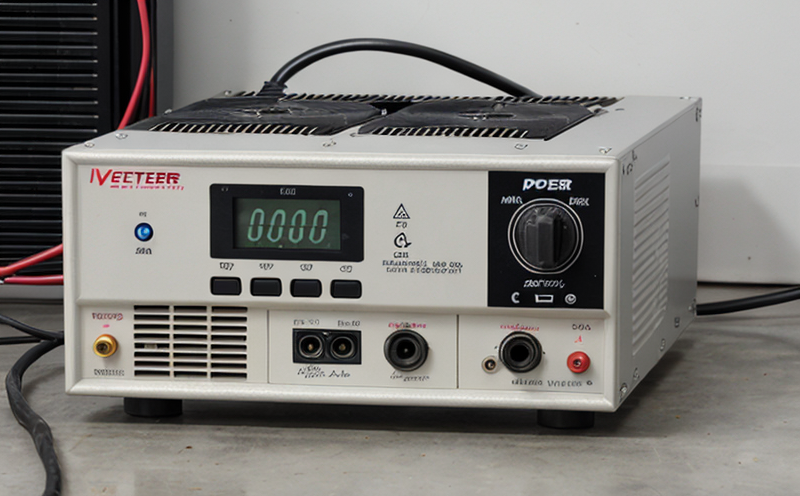IEC 62921 EMC Testing for Renewable Energy Inverters
The International Electrotechnical Commission (IEC) Standard IEC 62921 provides a framework for ensuring electromagnetic compatibility (EMC) in renewable energy systems. This standard is crucial as it helps guarantee that inverters and other power electronics operate effectively without causing or being affected by electromagnetic interference (EMI).
EMC testing under this standard focuses on the performance of inverters across a range of environments, which can vary depending on their deployment. For instance, inverters used in utility-scale solar farms may face different challenges compared to those installed in residential settings. The tests assess how well an inverter maintains its functionality and performance when subjected to electromagnetic interference from other devices or environmental factors.
Key aspects of IEC 62921 include measurement methods for both conducted and radiated emissions, as well as the immunity of inverters against these interferences. The standard specifies detailed procedures for testing in controlled laboratory environments that simulate real-world conditions, ensuring that devices perform reliably under all expected circumstances.
Compliance with IEC 62921 is essential for manufacturers aiming to meet regulatory requirements and ensure product quality. By conducting rigorous EMC tests, we help our clients validate their designs against stringent international standards, thereby enhancing the reliability and performance of their products in diverse operational scenarios.
The testing process involves several stages: initial design reviews, hardware-in-the-loop simulations, and final laboratory-based EMC testing. During these phases, various parameters such as frequency ranges, measurement points, and interference levels are carefully controlled to ensure accurate assessments. This comprehensive approach ensures that any potential issues are identified early in the development cycle.
Understanding the broader context of renewable energy systems is important for appreciating the significance of this testing. Inverters play a critical role by converting direct current (DC) from solar panels or wind turbines into alternating current (AC), which can then be fed into the grid. Ensuring that these devices meet EMC standards not only protects them but also contributes to overall system stability and reliability.
For quality managers, compliance officers, R&D engineers, and procurement teams involved in renewable energy projects, ensuring adherence to IEC 62921 is paramount. It provides a structured method for validating the robustness of inverters against electromagnetic interference, which is vital given the increasing complexity and interconnectivity of modern power systems.
Environmental factors such as temperature variations, humidity levels, and altitude changes can significantly influence the performance of renewable energy devices. By simulating these conditions during EMC testing, we can identify any vulnerabilities early on, allowing for necessary adjustments before product launch.
- Conducted Emissions: Measures the interference caused by signals that travel through wires or cables.
- Radiated Emissions: Assesses the electromagnetic waves emitted by equipment into its environment.
- Immunity Testing: Evaluates how well an inverter can function when exposed to various types of interference.
Benefits
Conducting IEC 62921 EMC testing offers numerous benefits for manufacturers and developers of renewable energy systems. Firstly, it ensures compliance with international standards, which is often a prerequisite for market entry in many countries. Meeting these requirements enhances the credibility of your products, making them more attractive to potential buyers.
Secondly, this form of testing helps identify potential issues early on in the product lifecycle. Early detection allows for corrective measures to be implemented before significant costs are incurred during later stages of production or deployment. This proactive approach can save substantial amounts of money and time.
Thirdly, compliance with IEC 62921 fosters trust among stakeholders including customers, investors, and regulatory bodies. Demonstrating adherence to recognized standards reassures all parties that your products meet high-quality benchmarks.
Lastly, by ensuring EMC performance through rigorous testing, you contribute to the overall reliability and longevity of renewable energy systems. Reliable inverters are crucial for maintaining optimal system performance over extended periods, thereby reducing maintenance costs and extending operational life.
Quality and Reliability Assurance
The importance of quality and reliability in the context of IEC 62921 cannot be overstated. Ensuring that inverters meet these stringent standards is critical for several reasons:
- Reduces Operational Risks: Proper EMC testing minimizes the risk of equipment failures due to electromagnetic interference, leading to more stable and dependable systems.
- Increases Customer Trust: Compliance with international standards builds trust among customers and stakeholders, fostering long-term relationships.
- Lowers Maintenance Costs: By identifying potential issues early through thorough testing, you can prevent costly repairs or replacements down the line.
- Enhances Product Reputation: Demonstrating a commitment to quality standards enhances your brand’s reputation and market position.
In conclusion, incorporating IEC 62921 EMC testing into your product development process is an investment in long-term success. It ensures that your inverters are not only reliable but also meet the highest industry expectations, paving the way for sustainable growth in the renewable energy sector.
Environmental and Sustainability Contributions
- Reduction of Electromagnetic Interference: By minimizing EMI, we help protect other electronic devices from potential interference, contributing to a cleaner electromagnetic environment.
- Energy Efficiency: Ensuring inverters operate efficiently reduces energy losses and promotes the use of renewable resources more effectively.
- Sustainable Manufacturing Practices: Compliance with international standards encourages sustainable manufacturing processes, reducing environmental impact throughout the product lifecycle.
The focus on quality through EMC testing aligns perfectly with broader sustainability goals. By promoting efficient use of renewable energy resources and minimizing negative environmental impacts, we contribute to a more sustainable future for all stakeholders involved in the industry.





